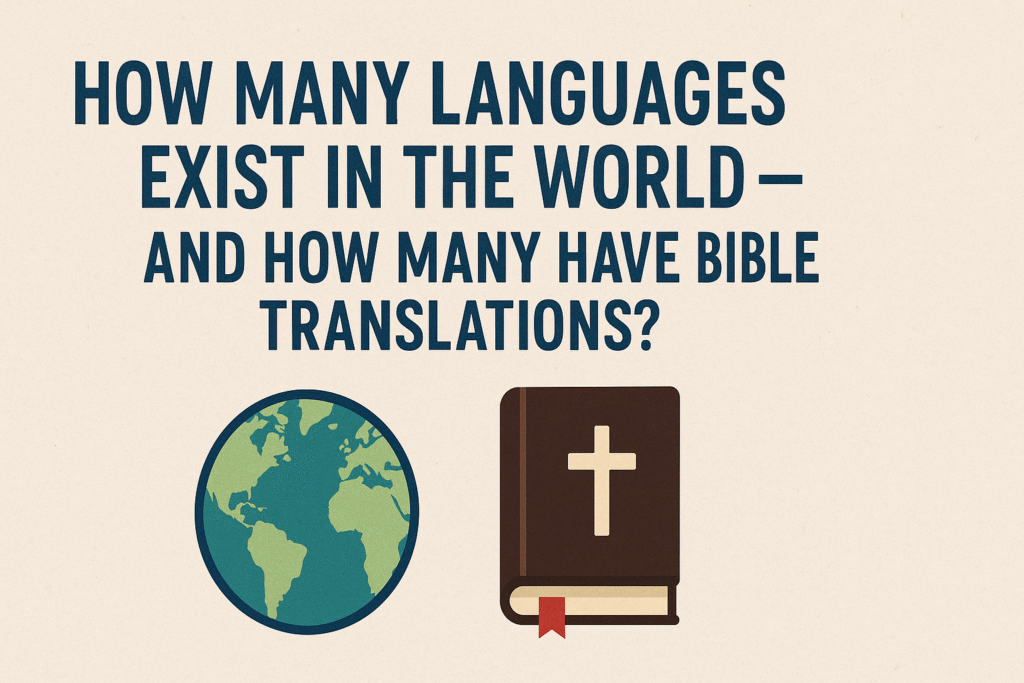Have you ever pondered how many people today can read or hear God’s Word in their native language?
This question is at the heart of modern mission work. Language impacts culture, philosophy, and faith and it is still one of the most effective instruments for spreading the Gospel.
At Christian Lingua, we’ve witnessed firsthand how translation can introduce entire nations to God’s message. However, the reality is sobering: despite the fact that dozens of languages exist around the world, many people continue to wait for the Bible in their native tongue. Let’s take a look at current Bible translation statistics and why this goal is still so important to churches, publishers, and ministries.
How Many Languages Exist in the World?
According to Ethnologue, the world’s most comprehensive language database, there are around 7,000 languages spoken around the world. These range from global tongues like English, Spanish, and Mandarin to indigenous languages spoken by a few hundred people.
However, linguistic vitality varies greatly:
Approximately 90% of the world’s population speaks one of the 100 most common languages.
Thousands of smaller languages are endangered, with some spoken exclusively by elders in rural areas.
This vast linguistic diversity is both a challenge and a call to global missions. Every language represents a people group that God cherishes, a community that deserves to hear Scripture in words that speak to their hearts.
How Many Languages Have Bible Translations?
As of 2025, the Bible had been translated into over 3,700 languages, either entirely or partially. That is remarkable growth, but it also means that around half of the world’s languages still lack any Scripture at all.
- Here is a snapshot of the current number of Bible translations.
- The complete Bible is available in over 740 languages.
- The New Testament is written in about 1,700 different languages.
- Portions or chosen books: Over 1,200 languages
Over 95 percent of the world’s population has access to some portion of Scripture. Even so, millions of verses remain untranslated.
That is why organizations like Wycliffe, the Seed Company, and other Christian translation ministries continue this important job. Each translation brings the Gospel closer to communities that have never heard Jesus’ words expressed in their native language.
Why Bible Translation Still Matters Today
At first look, it may appear that the translation process is almost complete—after all, most major languages already have complete Bibles. However, the mission is far from over.
Bible translation is significantly more than just linguistic accuracy; it also involves cultural comprehension. A text may be available in a national language yet inaccessible to those who think, pray, and dream in another dialect.
For instance, a church in rural Africa may require a Bible in the local language to reach out to young Christians, even if it is available in English or French. A deaf congregation may require Scripture interpretation in ASL or video format. A Christian media producer may require voice-over and overdub versions when broadcasting Scripture-based programming on television or YouTube.
These examples demonstrate that translation is more than just a language chore; it is a ministry call. At Christian Translation Services, we see how a single translated sermon, CD, or devotional can spark revival in communities with limited access to faith-based resources.
The Power of Translation: Stories That Inspire
Consider a ministry partner who has recently created a children’s Bible series. Christian Lingua translated voice-overs and subtitles into 15 languages, including Arabic, Swahili, and Tagalog. Soon after the introduction, families began sharing stories of youngsters praying in their own languages for the first time.
Consider a Christian author who wanted her discipleship book available to believers in Eastern Europe. Her work is now reaching pastors and study groups in numerous countries via Christian translation agencies, assisting believers in growing in their faith in areas where English versions had little impact.
Each initiative exemplifies the Great Commission in action, demonstrating that as linguistic barriers crumble, the Gospel advances.
How Churches and Ministries Can Participate
The work of Bible translation falls to all of us. Ministries may help by sponsoring translation efforts for unreached languages:
- Localizing media content, such as films, podcasts, and courses, to ensure cultural compatibility.
- Working with competent translators who comprehend Scripture as well as linguistic intricacies.
- Supporting the deaf and visually challenged communities through ASL, captioning, and audio narration.
Whether you lead a church, publish Christian publications, or create online courses, translation allows you to reach a larger audience while also honoring each culture’s voice.
Partnering with Christian Lingua in the Mission
Since 2006, Christian Lingua has provided translation, voice-over, overdub, and interpretation services in over 220 languages to ministries, publishers, and media networks worldwide. Our passion is to contribute to the Great Commission by breaking down language barriers so that every nation can hear the Good News.
When you work with Christian Lingua, you are more than just hiring translators; you are joining a movement that thinks every word of Scripture should be heard in every heart language.
Final Thoughts: Every Language, Every Nation
The narrative of Bible translation is both humbling and encouraging. From the first Latin manuscripts to today’s digital Bibles, God has utilized translators, linguists, and ministries to spread His Word throughout the world. Nonetheless, as thousands of tongues await their first verse, the mission continues.
If your ministry, publishing firm, or media organization wants to reach new audiences, examine how language might help you do so.
➡️ Join Christian Translation Services in spreading God’s Word to every tribe, tongue, and nation.
